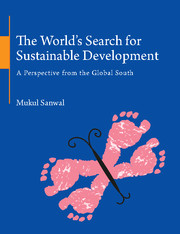Book contents
- Frontmatter
- Dedication
- Contents
- Preface
- Acknowledgments
- Abbreviations
- INTRODUCTION
- 1 Social Dimension of Sustainability
- CONSUMPTION IN AN UNEQUAL WORLD: FRAMING INTERNATIONAL COOPERATION
- CLIMATE POLICY: GLOBAL TO NATIONAL
- SUSTAINABLE DEVELOPMENT: NATIONAL TO GLOBAL
- CONSUMPTION IN A MORE EQUAL WORLD: SHAPING SOCIETAL FUNCTIONS
- GEOPOLITICS TO GEOECONOMICS: RURAL–URBAN DIVIDE, RATHER THAN BETWEEN COUNTRIES
- THE ASIAN CENTURY
- Index
CONSUMPTION IN A MORE EQUAL WORLD: SHAPING SOCIETAL FUNCTIONS
Published online by Cambridge University Press: 18 December 2015
- Frontmatter
- Dedication
- Contents
- Preface
- Acknowledgments
- Abbreviations
- INTRODUCTION
- 1 Social Dimension of Sustainability
- CONSUMPTION IN AN UNEQUAL WORLD: FRAMING INTERNATIONAL COOPERATION
- CLIMATE POLICY: GLOBAL TO NATIONAL
- SUSTAINABLE DEVELOPMENT: NATIONAL TO GLOBAL
- CONSUMPTION IN A MORE EQUAL WORLD: SHAPING SOCIETAL FUNCTIONS
- GEOPOLITICS TO GEOECONOMICS: RURAL–URBAN DIVIDE, RATHER THAN BETWEEN COUNTRIES
- THE ASIAN CENTURY
- Index
Summary
‘… International cooperation and the resulting governance mechanisms are not working well. First, the current global governance system is not properly equipped to manage the growing economic integration and interdependence among countries, both of which are compounded by the current globalization process. Globalization tends to accentuate interdependencies among countries. Second, global governance structures and rules are characterized by severe asymmetries in terms of access, scope and outcomes. While developing countries must abide by and/ or shoulder the effects of global governance rules and regulations, they have limited influence in shaping them. Meanwhile, the unbalanced nature of globalization implies that important areas of common interest are currently not covered, or sparsely covered, by global governance mechanisms, while other areas are considered to be over determined or overregulated by a myriad of arrangements with different rules and provisions, causing fragmentation, increased costs and reduced effectiveness. These deficiencies have contributed to the generation of asymmetric outcomes among countries and have had important implications for inequality at the national level as well. Finally, current approaches to global governance and global rules have led to a greater shrinking of policy space for national Governments, particularly in the developing countries, than necessary for the efficient management of interdependence; this also impedes the reduction of inequalities within countries’.
Committee for Development Policy, 2014, Policy Note, Global governance and global rules for development in the post-2015 era, Department of Economic and Social Affairs, United Nations, June 2014. The Committee for Development Policy (CDP) is an expert body of the Economic and Social Council composed of 24 members serving in their personal capacity.
‘Today an average European consumes 40–60 tons of material each year. A sustainable level of material use per individual has however been calculated at 7–10 tons per year which means that the average individual lifestyle material use needs to be reduced by about 80%. … A main challenge to achieve these changes is that future individual consumers will not compromise on quality, convenience, price or status when it comes to purchasing decisions. … New transformative approaches towards sustainable consumption and production are thus needed … identifying solutions that can reduce the volume rather than the value of what we consume’.
- Type
- Chapter
- Information
- The World's Search for Sustainable DevelopmentA Perspective from the Global South, pp. 217 - 218Publisher: Cambridge University PressPrint publication year: 2015



